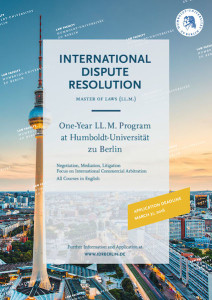 You read it here first, back in 2013, but at the time with a question mark, and then again in 2014 and 2015. Finally, 2017 is the year it is actually going to happen: Germany is about to change its approach to discovery of documents under the Convention of 18 March 1970 on the Taking of Evidence Abroad in Civil or Commercial Matters, commonly known as the Hague Evidence Convention. The bill that would remove Germany’s reservation pursuant to Article 23 of the Convention* has been introduced into Parliament. It passed the Upper Chamber (Bundesrat) late last year without any objections. Read More
You read it here first, back in 2013, but at the time with a question mark, and then again in 2014 and 2015. Finally, 2017 is the year it is actually going to happen: Germany is about to change its approach to discovery of documents under the Convention of 18 March 1970 on the Taking of Evidence Abroad in Civil or Commercial Matters, commonly known as the Hague Evidence Convention. The bill that would remove Germany’s reservation pursuant to Article 23 of the Convention* has been introduced into Parliament. It passed the Upper Chamber (Bundesrat) late last year without any objections. Read More
Month: January 2017
Seizure of Bank Accounts in Europe: European Account Preservation Order Available Now
 On January 18, 2017, new rules governing the seizure of bank accounts in the European Union came into force: The EU Regulation No 655/2014 of May 15, 2014 established a European Account Preservation Order (EAPO) to facilitate cross-border debt recovery in civil and commercial matters. The EAPO procedure is available immediately. Read More
On January 18, 2017, new rules governing the seizure of bank accounts in the European Union came into force: The EU Regulation No 655/2014 of May 15, 2014 established a European Account Preservation Order (EAPO) to facilitate cross-border debt recovery in civil and commercial matters. The EAPO procedure is available immediately. Read More
Humboldt-Universität zu Berlin: Graduate Degree Programme in International Dispute Resolution
 Since 2015 the Law Faculty of Humboldt-Universität zu Berlin offers a one-year full-time graduate degree programme in International Dispute Resolution (IDR), with a strong emphasis on international commercial arbitration. The programme is open to law graduates from jurisdictions around the world. The language of instruction is English. The application deadline for the 2017/2018 programme is March 31, 2017. More information regarding the program can be found in this brochure.
Since 2015 the Law Faculty of Humboldt-Universität zu Berlin offers a one-year full-time graduate degree programme in International Dispute Resolution (IDR), with a strong emphasis on international commercial arbitration. The programme is open to law graduates from jurisdictions around the world. The language of instruction is English. The application deadline for the 2017/2018 programme is March 31, 2017. More information regarding the program can be found in this brochure.
Provisional Enforcement of Arbitral Awards in Germany
![]() Under German law, you can combine the application for the recognition and enforcement of an arbitral award with an application to allow provisional enforcement measures, such as freezing bank accounts and attaching assets. Pending a decision on the recognition and enforcement of the award, these assets can thus be secured. However, the relevant section of the German Civil Code (Zivilprozessordnung, ZPO) appears to have been imperfectly integrated into the overall system of provisional enforcement, which led to a string of – partly contradictory – court decisions. Read More
Under German law, you can combine the application for the recognition and enforcement of an arbitral award with an application to allow provisional enforcement measures, such as freezing bank accounts and attaching assets. Pending a decision on the recognition and enforcement of the award, these assets can thus be secured. However, the relevant section of the German Civil Code (Zivilprozessordnung, ZPO) appears to have been imperfectly integrated into the overall system of provisional enforcement, which led to a string of – partly contradictory – court decisions. Read More
